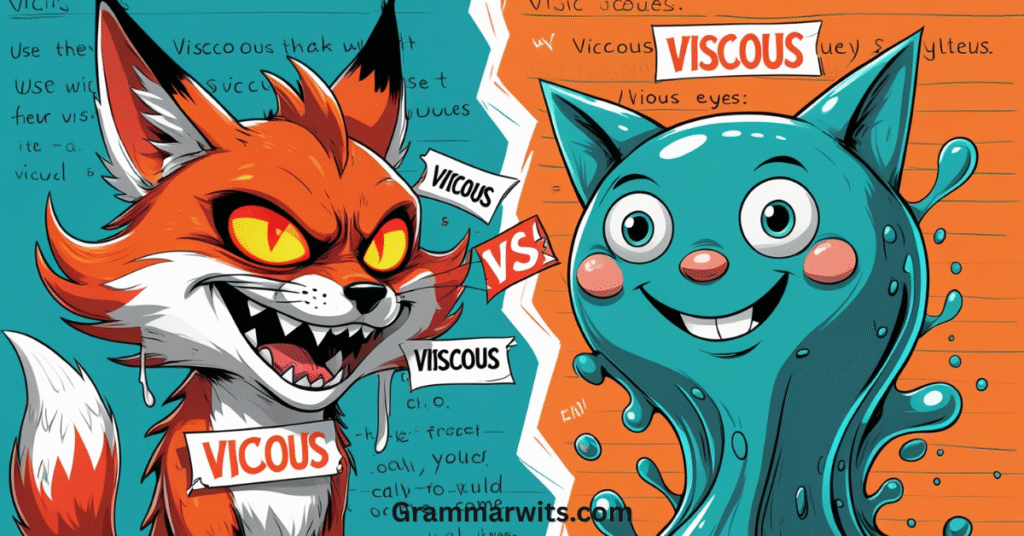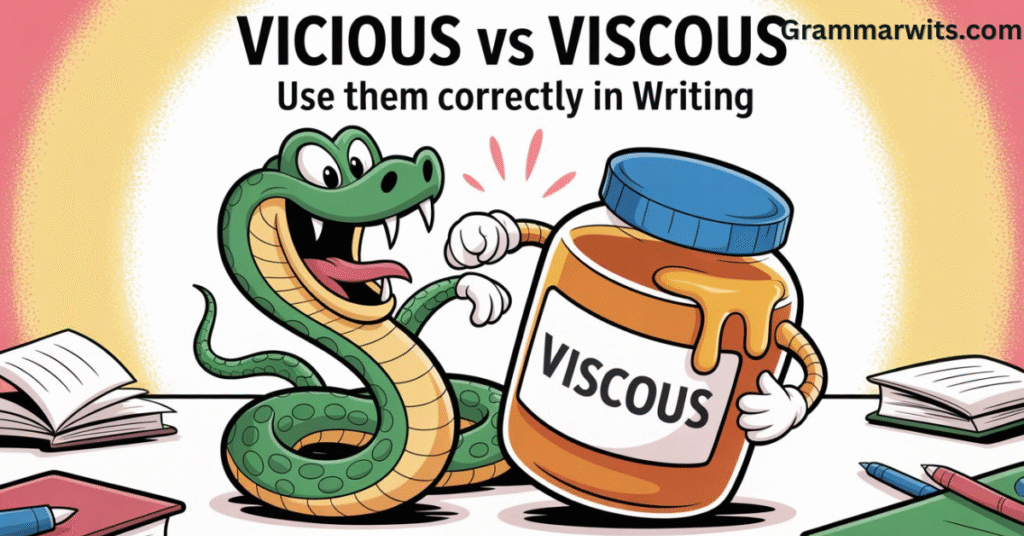“Vicious vs viscous” refers to the clear but often misunderstood distinction between two similar-sounding adjectives in English. Vicious means deliberately cruel, violent, or dangerous—typically used to describe harmful behavior, attacks, or intentions. On the other hand, viscous refers to a thick, sticky consistency in liquids, emphasizing resistance to flow. While both words share phonetic similarities and end in “-ous,” their meanings and usage belong to entirely different worlds—one rooted in aggression and the other in physical texture.
With just one misplaced letter, your writing can shift from dreadful behavior to syrupy substances. These two terms may look alike, but using them incorrectly can lead to unintended humor or serious confusion. A single slip—like calling a rumor viscous—can derail your message and undermine your credibility. This is where mastering the nuances of similar-sounding words gives your writing precision and polish.
Whether you’re crafting a compelling article or simply aiming for clarity, knowing the difference between vicious vs viscous is essential. From fiery arguments to sticky glue, each word brings a distinct tone and meaning. Learning their proper usage not only strengthens your vocabulary but also sharpens the impact of your communication across every context.
The Root of All Confusion
Why do smart people stumble over vicious vs viscous? The answer lies in their phonetic similarity and spelling similarity. Both words share the same first five letters: V-I-C-I-O/U-S. Your brain processes them as nearly identical until that crucial sixth letter appears.
The pronunciation differs by just one vowel sound. “Vicious” sounds like “VISH-us,” while “viscous” sounds like “VIS-kus.” This subtle difference gets lost in rapid speech or internal reading.
Homophones create another layer of confusion. When you hear these words spoken, the distinction becomes even murkier. Your mind fills in the spelling based on context, but sometimes context clues mislead you.
Here’s where it gets tricky: Both words function as adjectives, describing qualities or characteristics. This part of speech similarity means they can often appear in similar sentence structures, making lexical choice more challenging.
Vicious Decoded: When Words Bite Back

Vicious meaning centers on deliberate cruelty or violence. This word usage encompasses both behavioral descriptions and metaphorical applications. When something is vicious, it’s designed to cause harm, pain, or damage.
The primary definition involves cruel behavior or aggressive behavior. A vicious dog attacks without provocation. A vicious rumor spreads with intent to destroy someone’s reputation. These examples show harmful actions that stem from malicious intent.
Vicious pronunciation follows the pattern “VISH-us” with emphasis on the first syllable. Remember this by connecting it to “vice” – both words share the concept of wrongdoing or moral failing.
Beyond direct cruelty, “vicious” appears in compound phrases like “vicious cycle.” This usage describes self-perpetuating negative patterns where one problem creates another, which worsens the original issue.
Contextual meaning varies across different writing styles:
- Literature: Character descriptions showcasing moral corruption
- Journalism: Reporting on violence or brutal attacks
- Business: Describing cutthroat competition or hostile takeovers
- Psychology: Analyzing destructive behavioral patterns
Viscous Unveiled: The Science of Thickness
Viscous meaning relates entirely to physical properties of liquids and their resistance to flow. This word usage appears primarily in scientific, culinary, and industrial contexts where liquid consistency matters.
Viscosity measures how thick or thin a liquid flows. Honey demonstrates high viscosity – it pours slowly and sticky texture clings to surfaces. Water shows low viscosity, flowing freely without resistance.
Viscous definition encompasses any thick liquid or sticky substance that resists movement. Think maple syrup, motor oil, or lava. These materials flow differently than water because their molecular structure creates internal friction.
Viscous pronunciation sounds like “VIS-kus” with a hard “s” sound. Connect this to “thick” – both describe physical properties you can observe and measure.
Temperature affects viscosity dramatically. Cold honey becomes more viscous, while heated honey flows like water. This relationship appears frequently in cooking instructions and industrial processes.
Common applications include:
- Cooking: Describing sauces, syrups, and batters
- Manufacturing: Discussing paints, adhesives, and lubricants
- Geology: Explaining lava flows and mud consistency
- Medicine: Analyzing blood thickness and medication properties
Side-by-Side Battle: Key Distinctions
Understanding vicious vs viscous requires examining their semantic difference across multiple dimensions. These commonly confused words operate in completely separate domains despite their surface similarity.
| Aspect | Vicious | Viscous |
|---|---|---|
| Nature | Behavioral/emotional quality | Physical property |
| Domain | Psychology, ethics, behavior | Science, physics, chemistry |
| Usage | People, animals, actions, cycles | Liquids, substances, materials |
| Feel | Threatening, dangerous, harmful | Thick, sticky, slow-moving |
| Measurement | Subjective assessment | Objective, quantifiable |
Word difference becomes clear when you consider what each word can modify. “Vicious” describes living things or abstract concepts capable of intent. “Viscous” describes materials with measurable physical properties.
Language precision demands correct word usage in professional contexts. Scientific papers never describe thick syrup as “vicious” unless discussing its marketing strategy. Food reviews don’t call aggressive flavors “viscous” unless describing texture.
Lexical semantics shows these words occupy different conceptual spaces. “Vicious” belongs to the moral/behavioral domain, while “viscous” inhabits the physical/scientific realm.
Context Mastery: Power Examples in Action

Vicious vs viscous examples demonstrate how writing clarity depends on choose the right word decisions. These real-world applications show the impact of proper word usage across different writing contexts.
Vicious Applications
Cruel behavior examples in literature:
- “The vicious queen ordered executions for minor infractions.”
- “His vicious temper destroyed every relationship he attempted.”
- “The critic’s vicious review demolished the young author’s confidence.”
Harmful actions in journalism:
- “The vicious attack left three people hospitalized.”
- “Corporate executives launched a vicious campaign against whistleblowers.”
- “The vicious storm system spawned multiple tornadoes.”
Vicious cycle usage:
- “Poverty creates a vicious cycle of limited opportunities.”
- “The vicious cycle of addiction requires professional intervention.”
- “Social media creates vicious cycles of comparison and inadequacy.”
Viscous Applications
Thick liquid descriptions in cooking:
- “The viscous caramel sauce coated the apple slices perfectly.”
- “Reduce the mixture until it becomes viscous and glossy.”
- “The viscous batter should coat the back of a spoon.”
Sticky substance usage in science:
- “The viscous polymer solution required special handling equipment.”
- “Viscous lava flows move at predictable rates down mountainsides.”
- “The viscous adhesive maintains strength under extreme temperatures.”
Liquid consistency applications:
- “Motor oil becomes less viscous as engine temperature rises.”
- “The viscous coating protects metal surfaces from corrosion.”
- “Blood becomes more viscous in cold temperatures.”
Word Family Trees: Synonyms & Precision

Vicious synonyms provide alternatives when improve writing requires variety. These English adjectives carry similar meanings but different intensity levels and contextual meaning.
Aggressive behavior alternatives:
- Brutal – emphasizes physical violence
- dreadful- suggests rudimentary, uncontrolled violence
- Malicious – highlights intentional harm
- Spiteful – focuses on petty cruelty
- Ruthless – indicates lack of mercy
- Ferocious – suggests animal-like intensity
Viscous synonyms offer semantic accuracy when describing substance consistency:
- Thick – general term for high viscosity
- Syrupy – suggests sweetness and stickiness
- Gelatinous – indicates jelly-like consistency
- Gooey – informal term for sticky substances
- Dense – emphasizes weight and thickness
- Tacky – describes slightly sticky surfaces
Lexical accuracy improves when you match synonym intensity to context. “Brutal” works better than “vicious” when describing physical violence. “Syrupy” fits better than “viscous” in casual food writing.
Historical Word Journey: Etymology Matters
Word origin reveals why vicious vs viscous developed such different meanings despite similar appearances. Etymology shows how Latin roots shaped modern English word choice.
Vicious Origins
“Vicious” derives from Latin “vitiosus,” meaning “full of faults” or “defective.” The root “vitium” meant “fault” or “defect.” Medieval usage expanded this concept to include moral corruption and cruel personality traits.
The evolution shows:
- Latin: vitiosus (faulty, defective)
- Old French: vicios (corrupt, wicked)
- Middle English: vicious (morally corrupt)
- Modern English: vicious (deliberately cruel)
Viscous Evolution
“Viscous” comes from Latin “viscum,” meaning “mistletoe” or “birdlime” – a sticky substance used to catch birds. This word origin directly connects to the modern meaning of sticky texture.
The development pattern:
- Latin: viscum (sticky substance)
- Medieval Latin: viscosus (sticky, glutinous)
- Scientific Latin: viscous (resistance to flow)
- Modern English: viscous (thick, sticky liquid)
Professional Writing Applications

Grammar guide principles apply differently across professional contexts. Vicious vs viscous mistakes damage credibility more in some fields than others, making writing precision crucial for career success.
Academic Writing
Scientific papers demand correct spelling and semantic accuracy. Describing fluid resistance as “vicious” instead of “viscous” signals fundamental misunderstanding of basic concepts.
Grammar confusion in academic contexts:
- Physics papers discussing viscous forces
- Psychology studies analyzing vicious behavioral patterns
- Chemistry research examining viscous solutions
- Criminology papers studying vicious crime patterns
Business Communications
Corporate writing requires language precision to maintain professional credibility. Improve communication by double-checking commonly confused words before sending important documents.
Vocabulary help for business contexts:
- Market analysis describing vicious competition
- Product descriptions highlighting viscous consistency
- Safety reports documenting vicious equipment failures
- Quality control discussing viscous material properties
Creative Writing
Descriptive writing benefits from correct word usage to create intended effects. English confusion can accidentally change your story’s tone or meaning.
Text cohesion improves when you use vicious vs viscous appropriately:
- Character development showing vicious tendencies
- Setting descriptions featuring viscous environmental elements
- Action sequences involving vicious conflicts
- Sensory details describing viscous textures
Common Mistakes to Dodge
Grammar usage errors with vicious vs viscous follow predictable patterns. English learning improves when you recognize these mistake triggers and develop syntax awareness.
Auto-Correct Traps
Spell-check software often misses vicious vs viscous errors because both words are spelled correctly. This language mistakes category requires human proofreading and lexical choice awareness.
Writing tips for avoiding auto-correct problems:
- Read sentences aloud to catch pronunciation errors
- Use context clues to verify word meanings
- Double-check scientific or technical terminology
- Maintain a personal list of commonly confused words
Context Clues That Mislead
Sometimes surrounding words suggest the wrong choice. Semantic difference awareness prevents these English confusion traps.
Misleading context examples:
- “The vicious liquid” (describing harmful chemicals – should be “viscous” for thick consistency)
- “Viscous behavior” (describing mean actions – should be “vicious” for cruel behavior)
- “Vicious honey” (describing thick honey – should be “viscous” for consistency)
Proofreading Strategies
Grammar help comes from systematic editing approaches. Improve writing by implementing these writing clarity techniques:
- Separate editing passes – Check vicious vs viscous usage in dedicated proofreading rounds
- Read backwards – Start from the end to catch spelling similarity errors
- Use replacement tests – Substitute synonyms to verify contextual meaning
- Seek feedback – Ask others to identify word confusion in your drafts
Mastery Check: Testing Your Knowledge

English adjectives mastery requires practice with real-world applications. These exercises test your vicious vs viscous understanding in various contexts.
Quick Assessment
Choose the correct word for each sentence:
- The _______ dog attacked without warning.
- Maple syrup becomes more _______ in cold temperatures.
- The _______ cycle of poverty affects entire communities.
- This _______ adhesive bonds metal to plastic.
- Her _______ comments hurt his feelings deeply.
Answers: 1. vicious, 2. viscous, 3. vicious, 4. viscous, 5. vicious
Context Application
Vocabulary help improves through practical application. Consider how vicious vs viscous fits different professional scenarios:
- Medical writing: Blood viscosity measurements vs. vicious patient behaviors
- Food criticism: Viscous sauce consistency vs. vicious flavor combinations
- Business analysis: Vicious market competition vs. viscous manufacturing materials
- Academic research: Viscous fluid dynamics vs. vicious social patterns
Quick Reference Summary
Writing tips for vicious vs viscous mastery:
Remember “Vicious”:
- Contains “vice” (bad behavior)
- Describes cruel behavior or harmful actions
- Used for people, animals, or abstract concepts
- Pronunciation: VISH-us
Remember “Viscous”:
- Relates to viscosity (thickness)
- Describes thick liquid or sticky substance
- Used for materials with physical properties
- Pronunciation: VIS-kus
Grammar confusion disappears when you connect each word to its domain. Vicious lives in the behavioral world, while viscous belongs to the physical realm.
Strategic FAQ Section
What’s the easiest way to remember the difference between vicious and viscous?
The simplest memory trick connects each word to its core concept. Vicious contains “vice,” linking it to bad behavior and cruel personality traits. Viscous sounds like “thick,” connecting it to liquid consistency and sticky texture. When you encounter vicious vs viscous in writing, ask yourself: “Am I describing behavior or physical properties?”
Can you use both words to describe the same thing?
Rarely, but contextual meaning occasionally allows both words for different aspects of the same subject. A sticky substance might be viscous (thick consistency) and vicious (harmful to health). However, semantic accuracy requires using each word for its specific meaning rather than interchangeably.
Why do even experienced writers mix up these words?
Phonetic similarity and spelling similarity create cognitive interference. The brain processes vicious vs viscous as nearly identical until the final letters. Additionally, both function as English adjectives in similar sentence structures, making lexical choice more challenging. Writing precision requires conscious attention to word difference.
Are there any situations where the distinction doesn’t matter?
Language precision always matters in professional writing. Grammar usage errors damage credibility regardless of context. However, word confusion has less impact in informal speech where pronunciation makes the distinction clearer. Improve communication by maintaining correct word usage in all written contexts.
What happens if I use the wrong word in professional writing?
Vicious vs viscous mistakes can undermine your expertise and credibility. In scientific writing, calling something vicious instead of viscous suggests fundamental misunderstanding of basic concepts. In business contexts, language mistakes can confuse readers and damage professional relationships. Writing clarity requires proper word usage to maintain authority and trust.

Alizy Smith is a passionate language enthusiast and the admin of Grammar Wits. With a love for wordplay, grammar quirks, and witty expressions, she’s dedicated to making language learning fun and accessible. From grammar tips to pun-filled laughs, Alizy ensures every piece of content entertains while educating — turning tricky rules into easy, enjoyable reads.





